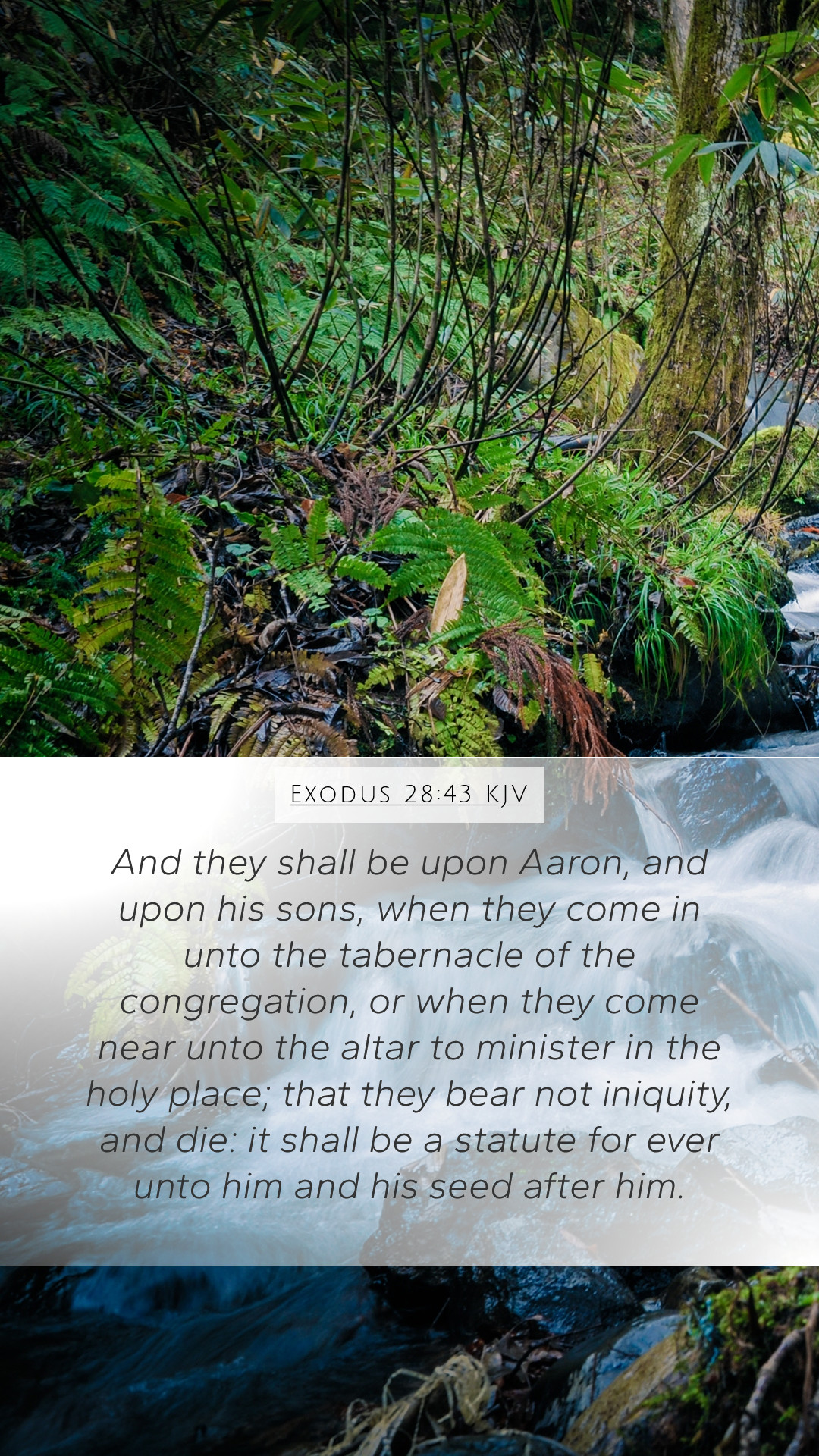Understanding Exodus 28:43
Exodus 28:43 states, "And they shall be upon Aaron, and upon his sons, when they come in unto the tabernacle of the congregation, or when they come near unto the altar to minister in the holy place; that they bear not iniquity, and die: it shall be a statute for ever unto him and his seed after him." This verse is part of the instructions God gave to Moses regarding the garments of the priests, emphasizing the significance of holiness and the serious nature of the priestly duty.
Bible Verse Commentary
This verse underscores the importance of the clothing that the priests must wear while serving in the tabernacle. The garments symbolize purity and the need for proper preparation when approaching God. Below are insights drawn from public domain commentaries:
-
Matthew Henry's Commentary:
Henry highlights that the garments of the priests serve not only a functional purpose but also act as a reminder of their sacred calling. The instruction to not bear iniquity is a warning that serving in the presence of the Lord is a heavy responsibility. The consequence of improper conduct is dire, stressing the necessity of maintaining holiness in service to God.
-
Albert Barnes' Notes:
Barnes explains that the priest's garments are intricately tied to their roles; they are both a sign of their office and a means of atonement. The phrase 'bear not iniquity' implies that priests must be blameless, reflecting the righteousness of God, as their actions could lead to severe repercussions.
-
Adam Clarke's Commentary:
Clarke points out that the garments are a perpetual reminder of the spirit of reverence that should accompany all acts of worship. He notes that the specifics of their attire indicate that with spiritual responsibilities come the requirement for moral integrity, as represented by the physical garments.
Biblical Exegesis
The broader context of Exodus 28 is essential for understanding this verse. The Lord provides detailed instructions for the garments of the high priest, symbolizing the serious nature of approaching God in worship. The indication that these practices are a ‘statute for ever’ emphasizes the perpetual nature of these divine directives.
Key Themes and Insights
- Holiness: The garments are a vital part of distinguishing the holy from the common, reflecting the purity required in worship and service.
- Responsibility: The priests are charged with maintaining their integrity, as their conduct directly impacts their ability to minister effectively.
- Divine Standards: God sets clear standards for service, which reinforces the concept that worship should not be taken lightly.
- Legacy: The instructions include future generations, indicating the importance of teaching holiness and responsibility in worship.
Application of Scripture
For contemporary believers, Exodus 28:43 serves as a reminder that all who serve in any capacity of ministry should do so with a heart of integrity and holiness. This call to maintain purity can be applied in various areas of life, including personal conduct, decision-making, and interactions with others.
Cross References
- Leviticus 10:1-2: Highlights the consequences of improper conduct in the priestly role.
- 1 Peter 2:9: Describes believers as a chosen people, emphasizing the call to holiness.
- Hebrews 5:1-3: Discusses the role and responsibilities of priests in relation to God.
Conclusion
This analysis of Exodus 28:43 reveals profound insights into the nature of holiness and responsibility within the context of worship. The rich commentaries provide a deeper understanding of the gravity of serving God and the importance of maintaining a pure heart in all endeavors related to faith. Whether in personal or communal worship, the themes from this verse resonate with the ongoing call for believers to approach God with reverence and integrity.
Bible Study Insights
In the context of Bible study groups or personal study, it is crucial to reflect on how the principles of this verse can be integrated into daily life. Exploring the historical context, discussing the symbolism of the priestly garments, and applying the teachings in a practical manner contribute to a well-rounded understanding of this scripture.
Questions for Reflection
- How can I ensure that my actions are reflective of the holiness required in serving others?
- In what ways can we teach the next generation about the significance of integrity in worship?
- What practical steps can I take to prepare my heart before serving in ministry?


